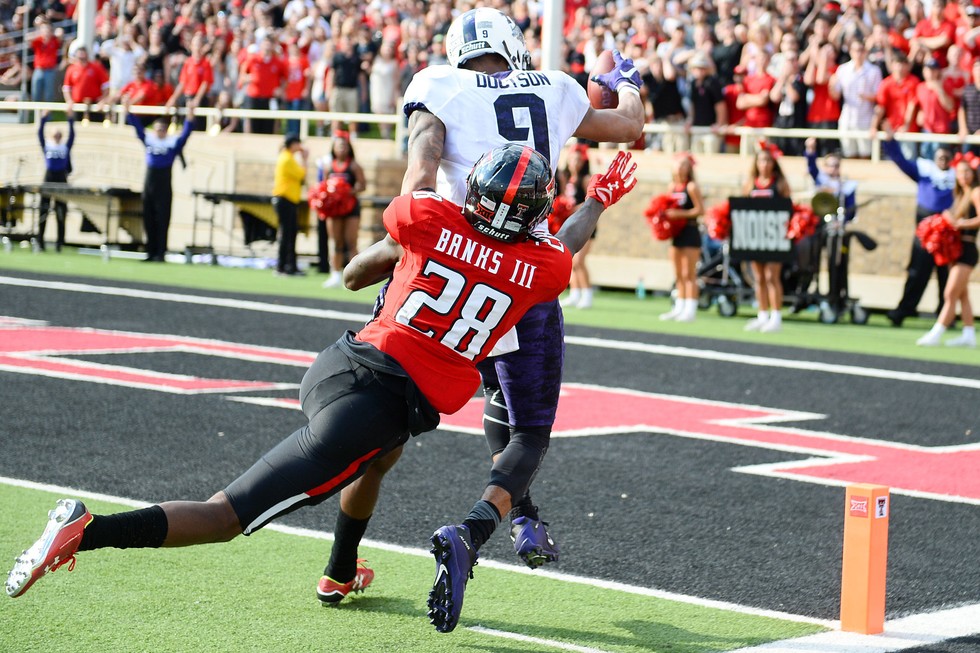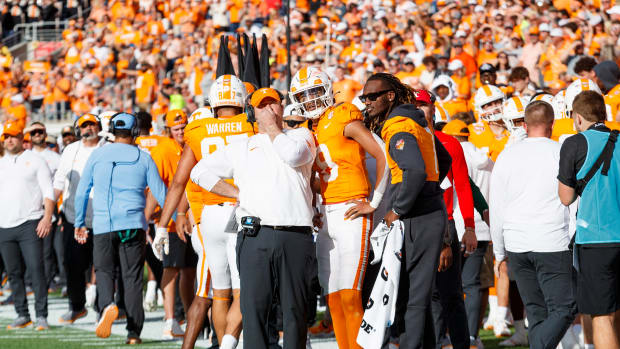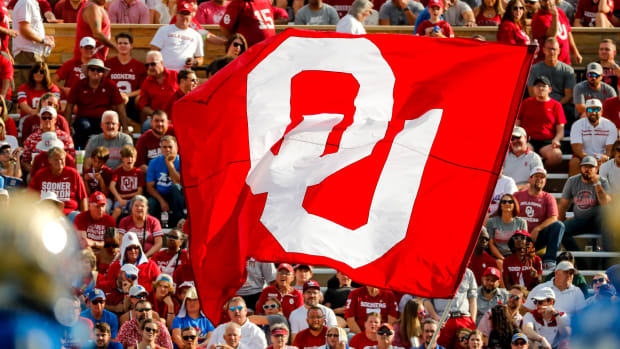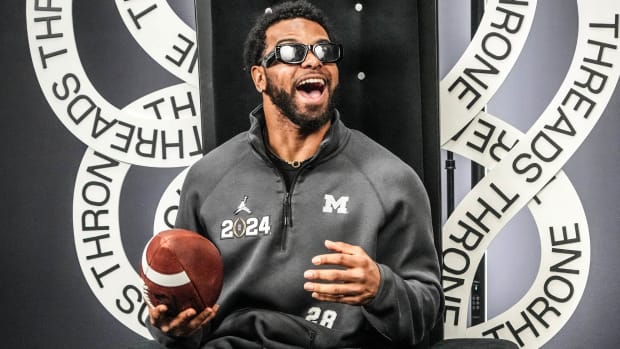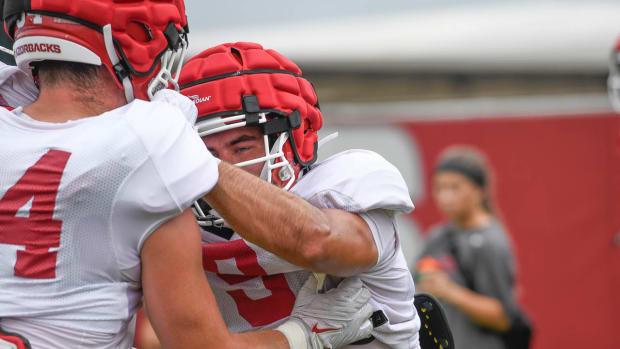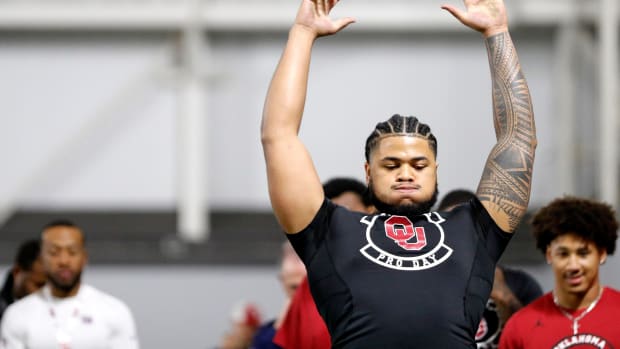Across the nation, teams are plagued by poor tackling; Florida prepares for success
The defining highlights of the 2015 college football season feature LSU's Leonard Fournette steamrolling through the Auburn secondary, Ohio State's Braxton Miller pirouetting through the Virginia Tech defense and TCU's Josh Doctson sashaying past Texas Tech cornerbacks.
All of those qualify as elite plays by the sport's most dynamic playmakers. But the seemingly endless loop of touchdown clips in a season that's featured a record scoring pace also have a common theme—shoddy tackling.
“The lack of tackling is a plague throughout the country," says former Oregon defensive coordinator Nick Aliotti. “Instead of giving out flu shots, they should give out tackling shots to college football players. It's an epidemic."
Poor tackling is easy to see and difficult to quantify, as there are no official statistics to back up what coaches are seeing. But with teams averaging 30.4 points through the 601 FBS games played so far—nearly a point more than the scoring record of 29.5 set in 2012—coaches point to missed tackles as a glaring issue from coast to coast. Coaches have a variety of theories to explain the tackling issue, including fear of concussions, changes in practice rules and the evolution of offense, which has been forcing players to tackle one-on-one in space more often.
“NFL scouts tell me most college teams just aren't physical in practice," says Temple coach Matt Rhule. “They are into the whole new age mindset of being fresh, rejuvenating, running plays and getting off the field. It's an offensive mindset, and it leads to bad defense."
On Sept. 26, UCLA traveled to Arizona for the biggest game of the day. The Bruins routed the Wildcats 56–30 in a forgettable contest that may be best remembered as a showcase for the woeful state of tackling in college football. UCLA's defensive coaches charted 21 missed tackles. Embarrassed Arizona defensive coaches declined to reveal the number of tackles missed by the Wildcats.
“Our tackling was awful," Arizona Coach Rich Rodriguez said in an interview last week. “It's a little frustrating—you worry every time you do go live if someone is going to get a concussion in practice and be out for a couple of weeks. But in the games they go full speed, and those backs aren't going to slow up like a scout team guy."
In his final season at Texas in 2013, Mack Brown famously declared, “Tackling is a problem in America right now."
So much of the game has changed in the past decade to make tackling a widespread problem. Consider that in 2006, teams averaged 64 plays a game on offense. Last year that number jumped to 72. The proliferation of up-tempo offenses not only has led to more plays, but also to many that are designed to make defenders tackle in space.
“The hardest thing to do in football is to tackle in the open field," says Rodriguez.
So how do coaches tackle the tackling problem? “Tackling is a skill and an art that's not innate," says Aliotti, now a Pac-12 Network analyst. “You must practice it."
But coaches simply can't just practice it more. Part of the reason tackling in space is so difficult is because it's a situation that is nearly impossible to replicate in practice. And there's less and less opportunity to replicate it.
Rodriguez says that 10 years ago, when he coached at West Virginia, his team would go full pads in practice at least two—and occasionally three—days a week. He says that every year since the amount of live practice reps has decreased. He says that the Wildcats go in full pads just one day a week.
The Pac-12 passed a rule in 2013 that limits teams to two full-contact practices each week. There are other restrictions, some of which were already in place, including the rule that only one practice during two-a-day summer camps can be full-contact, and that just eight of the permitted 15 spring practices can be full contact. The NCAA uses the conference's rules as its guidelines, and the Big 12 adopted the Pac-12's measures last year.
“You don't get to practice [tackling] enough live," Bruins defensive coordinator Tom Bradley says. “You just don't. Everyone is worried about that, the safety factor is involved. We're trying to take a lot less risks in practice."
Two of the biggest surprises in college football this season—Northwestern and Iowa—can attribute their undefeated starts in large part to better tackling. Wildcats coaches said part of their defensive renaissance has been due to the adoption of tackling techniques demonstrated in a Seattle Seahawks in structional video. The Hawkeyes are the only team in the country to not allow a rushing touchdown this year.
Northwestern coach Pat Fitzgerald has credited a renewed emphasis on tackling for the Wildcats resurgence this season. As Brian Hamilton reported on Campus Rush last week, Northwestern missed just 23 tackles through its first four games.
That puts Fitzgerald ahead of the curve. The rest of college football is figuring out ways to catch up. “The skills that you have to work on to be good in football aren't things you work on year round," Rodriguez says. “It's not like shooting free throws, or hitting baseballs or golf balls. You don't tackle year-round."
Rob Foldy/Getty Images
Better preparation the key to Florida's resurgence
First-year Florida coach Jim McElwain believes that his team is finally starting to get it. And by it, he doesn't mean how his Gators dominated Saturday night in their 38–10 rout of No. 3 Mississippi. He's referring to his players' much-improved preparation in the week leading up to the stunning upset—a victory that moved Florida up 14 places in the AP Top 25 and put the team in the College Football Playoff conversation much faster than anticipated.
"When you do it right, you do it right on Saturday," McElwain tells The Inside Read. "When you don't do it right, you don't do it right on Saturday. That's really what it is."
Because even as significant as Florida's 28-27 comeback win over Tennessee was the previous week, McElwain had been disappointed by his team's performance in practices leading up to the game, especially defensively. The missed tackles in those sessions led to what McElwain called "horrific" tackling against the Volunteers.
"It's just simply showing them what shows up on film Saturday is what you do during the week," McElwain says.
So before Florida began preparing for Mississippi last week, McElwain had his players watch video of their lackluster practice efforts in advance of Tennessee. He emphasized how it had carried over in their late victory against the Volunteers and challenged them to be much more diligent in their preparation for the Rebels.
"It's a choice," McElwain says. "Are we going to listen? Are we going to focus on the details? What are we going to do and how are we going to go about it? The results are based on those choices."
So while many were shocked by Florida's victory over Mississippi, McElwain wasn't. After all, his team had made the choice to have a week of preparation leading up to the game that was among the best of McElwain's two-plus decades of coaching.
It showed especially defensively Saturday as the Gators shutdown a potent Rebels offense that had been among the nation's best, averaging 54.8 points and 543 yards per game. On Saturday, Ole Miss had just 328 offensive yards and turned over the ball four times.
Florida gave up 419 yards of total offense to Tennessee and forced just one turnover in that triumph. "When we take care of the little things," McElwain says, "it shows up on Saturdays that we did that."
But McElwain wasn't basking in Saturday's victory on Sunday afternoon. He was busily watching tape for his team's game at two-time defending SEC East champion Missouri (4-1, 1-1) on Saturday. The Tigers have a 2-1 record against Florida since joining the SEC and those victories have come the last two seasons by a combined score of 78-30.
"To me, it's like, 'OK, so what?'" McElwain says of beating Mississippi. "How do you back that up the next week? Feel good about your performance, but more than that feel good about your preparation that helped you in your performance."
Even with Florida rocketing to a No. 11 ranking in the latest Associated Press poll behind its 5-0 record, McElwain insists his team can still be much improved. "Everybody thinks we've arrived as a team," McElwain says with a laugh. "That's the farthest thing from the truth. We've got a long way to go to get better."
That's why McElwain now has another challenge for his team: sustaining last week's preparation. "We'll see if they learned from that," he says, "or if we're going to take a step back."
Jamie Sabau/Getty Images
Ohio State coach: Elliott best running back in nation
As Ohio State running back Ezekiel Elliott warmed up on Saturday before his team's game at Indiana, he yelled to get the attention of his position coach, Tony Alford. "Coach," Elliott told Alford, "it's going to be something today!"
It was a rare prediction by the reserved Elliott, one that made Alford chuckle before he finally replied, "Oh really?"
Elliott simply smiled and gave Alford an answer he will never forget.
"Just watch," Elliott said.
Elliott's words ended up being prophetic as he dazzled with a career-high 274 rushing yards and three touchdowns on 23 carries to save the top-ranked Buckeyes from another near upset, in a 34-27 victory. Even more impressively, all but 31 of those yards came after halftime, as he reeled off his touchdown runs of 55, 65 and 75 yards.
Elliott's spectacular performance tied him for the second-most rushing yards in a game in Buckeyes' history with Keith Byars. It was also a reminder why the 6' 0", 225-pound junior, not LSU star running back Leonard Fournette, entered this season as the favorite for the Heisman Trophy.
Elliott had a breakout sophomore campaign last year in which he rushed for 1,878 yards and 18 touchdowns for his national championship-winning team. "I'd be hard pressed to think there's a better running back than him when you start looking at overall productivity and everything that he does," Alford tells The Inside Read.
Alford praises Elliott for his ability to block not just on blitzes, but also down the field. "What he does away from the ball is uncanny," Alford says. "His overall game is what really sets him apart. He's just a different guy when the ball's not in his hands."
So as impressive as Elliott's career day was Saturday, Alford was just as proud of the way Elliott was trying to cut block a safety 15 yards down the field Saturday during a run by quarterback Cardale Jones. "Those are the things that set him apart from anybody I've ever coached," Alford says.
That includes the six 1,000-yard rushers he's coached in his 21-year collegiate coaching career and Arizona Cardinals wide receiver Michael Floyd, who he tutored at Notre Dame.
Elliott is such a complete back that he rarely leaves the field. He seemingly participated in every play during Ohio State's 38-0 victory over Hawaii last month. "When he's out there, he goes," Alford says, "There's not any I'm getting the ball this play so I'm going to take it off. He just goes."
But Saturday when Elliott returned to the sideline after his touchdowns, he wasn't overly jubilant, according to Alford. He huddled with his coaches and offensive line to figure what he needed to do next. "That's how he approaches every day," Alford says. "He's never too high or too low."
As Elliott's runs piled up Saturday, Alford wasn't keeping up with his star tailback's rushing yardage. But after the game, Alford joked with Elliott about his impressive performance, reminding him that he didn't top the 310 rushing yards that Alford had for Colorado State in 1989 against Utah.
"I wasn't going to let him get to that," Alford says with a laugh. "I was going to pull him out before then."
After the game, Elliott did make sure to remind Alford of what he said prior to kickoff. He did so with a wink, but hasn't said anything else since then about his performance.
"I guess I should listen," Alford says with a laugh. "And just try to stay out of his way."
For a daily dose of college football insight, check out The Inside Read every weekday on Campus Rush.
